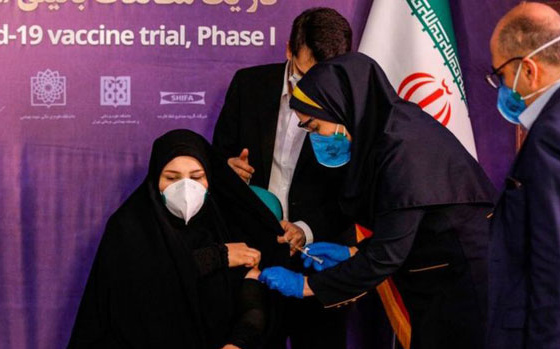A woman is injected in Iran’s first trial of a domestically-produced Coronavirus vaccine, December 2020
UPDATE, FEB 7:
President Hassan Rouhani has pledged a “significant number” of vaccinations by the start of Iranian New Year on March 20.
Speaking at the National Coronavirus Task Force on Saturday, Rouhani said medical staff, the elderly, and people with underlying diseases would be given priority.
Rouhani called for continued observation of social distancing and Coronavirus protocols. He noted the deaths in recent days of two former member of the Iranian national football team, both of whom were in their 40s.
“We can hope to stop the fourth wave of this pandemic if we all work together. It is essential to reduce traffic, gatherings and strictly follow the health protocols,” the President said.
He said it was “worrying” that observation of protocols had fallen from 81% to 75%: “We should expect to see an increase in the number of cases and deaths in the coming weeks”.
Task Force spokesperson Alireza Raisi echoed the warning, saying the number of “orange” cities — those at medium risk from the virus — has doubled in recent days.
Iran’s official death toll is 58,412 with more than 1.46 million confirmed cases.
UPDATE, FEB 6:
Iran has received its first delivery of Russia’s Sputnik V vaccine for Coronavirus.
A cargo of 500,000 doses arrived at Tehran’s Imam Khomeieni International Airport from Moscow on Thursday.
After in-fighting among Iranian officials over whether to begin inoculations with Sputnik V, Iran’s Ambassador to Russia Kazem Jalali said orders of 5 million doses have been placed. He added that the next deliveries will be on February 18 and February 28.
Iran’s official death toll is 58,336 with almost 1.5 million confirmed cases.
ORIGINAL ENTRY, FEB 1: Iran’s Government is in an internal dispute over use of the Russian Sputnik V vaccine to combat a Coronavirus pandemic which has officially claimed almost 58,000 lives.
The row started when the Medical Council reported that the Russian vaccine is not reliable because it has not been approved by the World Health Organization or a reputable international health authority.
Those who have raised questions include Dr. Minoo Mohraz, a member of the National Coronavirus Taskforce’s Scientific Committee; Hossein Ali Shahriari, chairman of Parliament’s Health Committee; and former MP Bahram Parsaei.
Mohraz said the decision to “provide and import the Russian vaccine by our Government is a misfortune for our people”.
Health Minister Saeed Namaki hit back at the objectors, accusing them of “malign motives”: “Can anybody believe that this country’s health minister is so dishonorable that he would allow an undesirable vaccine to enter this country? How can we stab our soldiers in the back this way?”
The head of Iran’s Food and Drug Administration, Mohammad Reza Shanehsaz, said those questioning the vaccine are “confusing the public” and challenged their expertise: “Some people express views about things that are not within the sphere of their profession.”
Iran’s Ambassador to Russia, Kazem Jalali, pressed ahead with the declaration that Tehran expects the first batch of the Sputnik V vaccine by February 4 and two more on February 18 and 28.
A Self-Imposed Problem
The Supreme Leader put the Government under pressure when he ruled in early January that Iran cannot import vaccines from the US, UK, or France.
Ayatollah Khamenei issued his declaration after the Revolutionary Guards challenged the Government’s plans for mass vaccination. Commanders said no troops would be vaccinated, and claimed vaccine producers are aiming to kill hundreds of millions of people, reducing the world’s population by 20%.
A spokesman of the Iranian Red Crescent Society, Mohammad Hassan Qosian Moqaddam, said hours later, “The import of 150,000 doses of the coronavirus vaccine [developed by] Pfizer Inc., from the United States to the country…is cancelled.”
Khamenei said vaccines could be obtained from other countries that were “reliable”. President Hassan Rouhani responded:
Whether the vaccine is made domestically or the vaccine is purchased from reliable companies that are 100% trusted, the Government will definitely take the necessary measures in this regard.
See also UPDATED: After Supreme Leader’s Command, Iran Halts Import of Pfizer’s Coronavirus Vaccine
Iran now has more than 1.4 million confirmed cases, with almost 4,000 patients in intensive care.
The rate of cases quadrupled in the autumn and deaths more than doubled, before the Government introduced strict containment measures in mid-November.
Daily cases have stabilized at more than 6,000 since the start of the years, and daily deaths have averaged between 80 to 90 since January 10.

